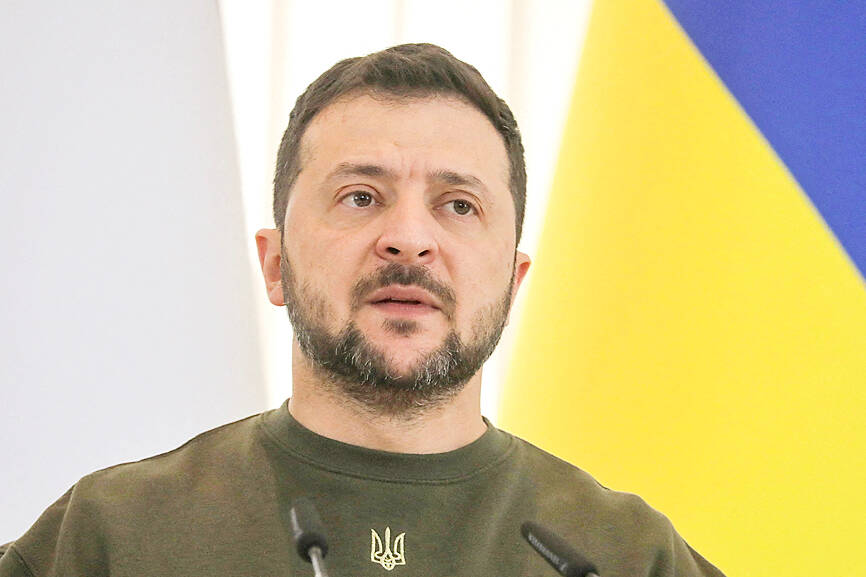Ukrainian President Volodymyr Zelenskiy on Monday said that he does not believe it is the right time for elections as debate intensifies on holding a vote next year while the country fights Russia’s invasion.
All elections, including the presidential vote set to take place next spring, are technically canceled under martial law that has been in effect since the conflict began last year.
“We must decide that now is the time of defense, the time of battle, on which the fate of the state and people depends,” Zelenskiy said in his daily address.

Photo: Reuters
He said it was a time for the country to be united, not divided, adding: “I believe that now is not the [right] time for elections.”
The frontline between the warring sides has remained mostly static for almost a year despite a Ukrainian counteroffensive, with Russian forces entrenched in southern and eastern Ukraine.
Officials from the US and Europe are reported to have suggested holding negotiations to end the 20-month-old conflict.
However, Zelenskiy has denied that Ukraine’s counteroffensive has hit a stalemate or that Western countries were leaning on Kyiv to enter talks.
The president, who was elected in 2019, said in September that he was ready to hold national elections next year if necessary, and was in favor of allowing international observers.
Former presidential aide Oleksiy Arestovych has announced that he would run against his former boss, after criticizing Zelenskiy over the slow pace of the counteroffensive.
Separately, Romanian Prime Minister Marcel Ciolacu on Monday said that Ukraine’s allies must stand firm in backing Kyiv or risk emboldening populist forces across Europe.
Ciolacu said that his government would forge ahead with “multidimensional support” for Ukraine even as European allies show signs of war fatigue, particularly with the Israel-Hamas conflict overshadowing Russia’s invasion.
The conflict in the Middle East is likely to be resolved sooner than the war next door to Romania, he said.
“Romania will continue to help Ukraine regardless of the political costs,” Ciolacu said in an interview in his office in Bucharest. “These political costs are less important than the precedent a Russian victory would create.”
“Can you image how many Putin lookalikes we would get among certain populist European politicians?” Ciolacu asked.
Additional reporting by Bloomberg

‘CHARM OFFENSIVE’: Beijing has been sending senior Chinese officials to Okinawa as part of efforts to influence public opinion against the US, the ‘Telegraph’ reported Beijing is believed to be sowing divisions in Japan’s Okinawa Prefecture to better facilitate an invasion of Taiwan, British newspaper the Telegraph reported on Saturday. Less than 750km from Taiwan, Okinawa hosts nearly 30,000 US troops who would likely “play a pivotal role should Beijing order the invasion of Taiwan,” it wrote. To prevent US intervention in an invasion, China is carrying out a “silent invasion” of Okinawa by stoking the flames of discontent among locals toward the US presence in the prefecture, it said. Beijing is also allegedly funding separatists in the region, including Chosuke Yara, the head of the Ryukyu Independence

UNITED: The premier said Trump’s tariff comments provided a great opportunity for the private and public sectors to come together to maintain the nation’s chip advantage The government is considering ways to assist the nation’s semiconductor industry or hosting collaborative projects with the private sector after US President Donald Trump threatened to impose a 100 percent tariff on chips exported to the US, Premier Cho Jung-tai (卓榮泰) said yesterday. Trump on Monday told Republican members of the US Congress about plans to impose sweeping tariffs on semiconductors, steel, aluminum, copper and pharmaceuticals “in the very near future.” “It’s time for the United States to return to the system that made us richer and more powerful than ever before,” Trump said at the Republican Issues Conference in Miami, Florida. “They

GOLDEN OPPORTUNITY: Taiwan must capitalize on the shock waves DeepSeek has sent through US markets to show it is a tech partner of Washington, a researcher said China’s reported breakthrough in artificial intelligence (AI) would prompt the US to seek a stronger alliance with Taiwan and Japan to secure its technological superiority, a Taiwanese researcher said yesterday. The launch of low-cost AI model DeepSeek (深度求索) on Monday sent US tech stocks tumbling, with chipmaker Nvidia Corp losing 16 percent of its value and the NASDAQ falling 612.46 points, or 3.07 percent, to close at 19,341.84 points. On the same day, the Philadelphia Stock Exchange Semiconductor Sector index dropped 488.7 points, or 9.15 percent, to close at 4,853.24 points. The launch of the Chinese chatbot proves that a competitor can

‘VERY SHALLOW’: The center of Saturday’s quake in Tainan’s Dongshan District hit at a depth of 7.7km, while yesterday’s in Nansai was at a depth of 8.1km, the CWA said Two magnitude 5.7 earthquakes that struck on Saturday night and yesterday morning were aftershocks triggered by a magnitude 6.4 quake on Tuesday last week, a seismologist said, adding that the epicenters of the aftershocks are moving westward. Saturday and yesterday’s earthquakes occurred as people were preparing for the Lunar New Year holiday this week. As of 10am yesterday, the Central Weather Administration (CWA) recorded 110 aftershocks from last week’s main earthquake, including six magnitude 5 to 6 quakes and 32 magnitude 4 to 5 tremors. Seventy-one of the earthquakes were smaller than magnitude 4. Thirty-one of the aftershocks were felt nationwide, while 79